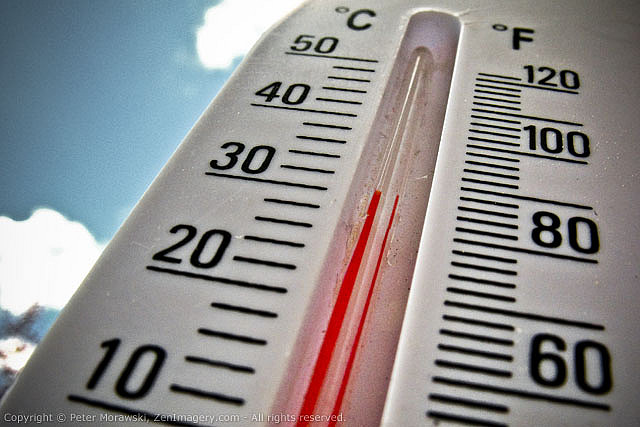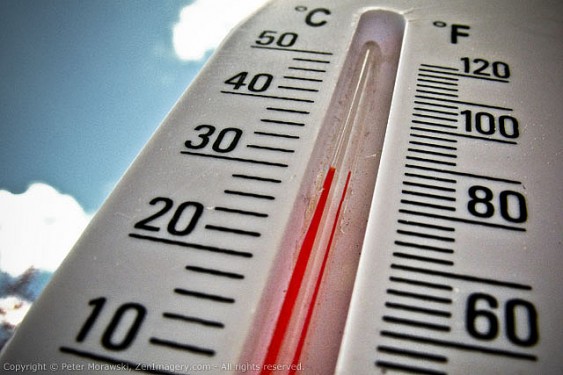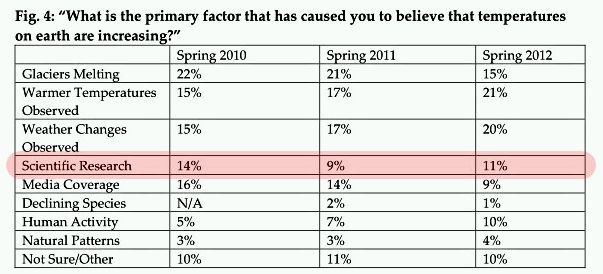Brookings has released a new survey that shows American public understanding of climate science is rebounding.
When Brookings asked Americans if the earth’s climate was warming in 2008, 72 percent of Americans said “yes.” By 2010 the number had sunk to a low 52 percent—and it stayed in the 50s for several years. Today it’s back up to 65 percent.
Not too shabby—especially as it reinforces a trend seen in other polling (see here, here, and here.)
The partisan divide is still alive and well. But, quite significantly, independents have moved in the direction of hard climate evidence by a whopping 20 points in just a year—from 52 to 72 percent. As Joe Romm points out, this move toward science by independents, the solidified stance among Dems, and the marked stagnation among Republicans adds up to make climate a winning wedge issue.
Here’s a snapshot:
Also notable is that just under two thirds (63 percent) of those on the correct side of climate science say that they are “very confident” in their position—14 percentage points higher than in the fall of 2011 and the highest level since Brookings started their climate polling in 2008.
But, as Kevin Drum cautions (and all us climate communicators know this in our bones already), the swing might not be happening for the reasons you think it is or hope it would be. In other words, it’s the weather, not more scientific evidence:
It would be nice to think that people are being swayed by the increasing torrent of scientific evidence about climate change, but it ain’t so. As the table below shows, only 11% of respondents say that scientific research is the main reason for belief in climate change. The most popular reason by far is personal observations of weather and warmer temperatures. And in a followup question, 68% of respondents said recent mild winters have had a large effect on their views.
Joe Romm put it this way: “Certainly the American public is seeing for themselves the off-the-chart heat waves and other extreme weather that climate scientists have long said would become more common as we pour more heat-trapping greenhouse gases into the atmosphere (see NOAA Chief: US Record of a Dozen Billion-Dollar Weather Disasters in One Year Is “a Harbinger of Things to Come”).”
And so it seems:
What are the takeaways?
Romm’s advice: “People are starting to connect the dots. Now if only policymakers can start doing the same…and seize on this winning issue.”
Drum’s advice: “…stop nattering on about the latest research. It may gall us to do it, but anecdotal evidence (mild winters, big hurricanes, wildfires, etc.) is probably our best bet. We should milk it for everything it’s worth.”
My advice: In plain language and in the simplest of terms, talk about extreme weather as a means to a frank, open, and honest conversation about climate impacts—and solutions.













quimby
Does the poll indicate whether the respondents believe that the warming is due to human activities? Without that, it doesn’t do much for advancing climate policies except perhaps mitigation. Also, it’s hard to see any policy that will unite those Democrats and Independants. Generally, the climate polling doesn’t do much for me because it ignores so many of the political realities. There was an interesting piece in the New Yorker recently (about the bully pulpit in general) noting that a President identifying a signature issue can actually work against developing solutions.
Dave McArthur
It is possible this column is off topic and is confused the point of being meaningless if its object is to promote a science of the stewardship of our atmosphere.
The fact that “72% of Independents acknowledge solid evidence of global warming” is meaningless because it does not mean they actually care about the impact of their activities on the climate balances that sustain us. They may, for instance, decide to vote for a political party that states that it cares for these vital balances by means of carbon trading systems rather than carbon taxation systems. Carbon trading systems are a profoundly flawed psychology and actively deny stewardship of our atmosphere. They tend to reward the polluters and punish the non-polluters. They enable polluters to continue polluting while salving their consciences. Indeed many people who say they believe human activities can impact climate balances generate far more pollution than many people who cannot imagine how their activities might impact on these balances. So talk about the climate may alter how people vote but may not alter how they act.
Here in New Zealand in the months after the release of Al Gore’s “Inconvenient Truth” new car purchases reached record highs, air travel increased 16% and the NZ Green Party ditched carbon taxes and implemented a carbon trading regime instead – exactly as was predicted pre the movie release. This occurred despite the rapidly rising price of mineral oil! Currently the NZ Government is borrowing a billion dollars a month for 4.4 million people to fund our national carbon trading scheme and subsidise extra motorway systems.
A science of stewardship is necessarily founded in the great principles of physics. These suggest that all objects are constantly warming as they are cooling- they exist while warming is balanced by cooling. This is the nature of universal change- all is a continual flux. This article denies reality by confusing warming with warming up i.e. no change of state with a change of state. This cannot be. Perhaps all those Americans surveyed are similarly confused? Certainly President Obama and many of his advisers are very confused about this basic physics and psychology.
More at http://www.thesustainabilityprinciple.org
In kindness.
Morgan
I’m curious if anyone is studying people between the ages of 15 and 25 who have or are going to school w/ climate curriculum. We policy junkies always try to sway voters and adults; I think that’s a questionable allocation of advocacy resources.
Mike Jones
You’re focusing on the top of the truck just above the ceiling of the bridge, when the answer lies in the other direction: letting a bit of air out of the tires.
All this business about harming the environment in general, and the climate in particular, is merely a reflection of how we humans treat each other, and treating each other much better begins with learning Esperanto.
Esperanto is the only hope for the world.